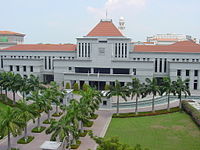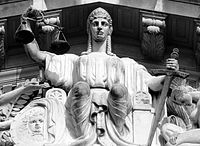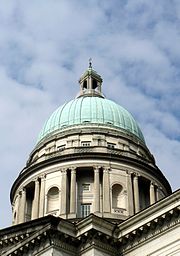- Judicial system of Singapore
-
Singapore 
This article is part of the series:
Politics and government of
Singapore
- President: Tony Tan Keng Yam
- Government
- Prime Minister: Lee Hsien Loong
- Cabinet
- Government organisations
- Judicial system
- Chief Justice: Chan Sek Keong
- Supreme Court
(Court of Appeal and High Court) - Subordinate Courts
The full Judicial power in Singapore is vested in the Supreme Court as well as subordinate courts by the Constitution of Singapore. The Supreme Court consists of the Court of Appeal and the High Court. The Court of Appeal exercises appellate criminal and civil jurisdiction, while the High Court exercises both original and appellate criminal and civil jurisdiction.[1] The Chief Justice, Judges of Appeal, Judicial Commissioners and High Court Judges are appointed by the President from candidates recommended by the Prime Minister. The prime minister must consult with the Chief Justice before recommending the judges. The current Chief Justice is Chan Sek Keong.
In 2006, the subordinate courts initiated a pilot scheme to appoint specialist judges to the Bench. These judges will come from the legal profession and academia and the scheme is aimed at bringing additional expertise to the subordinate courts as well as giving practitioners and academics an insight to the workings of the judiciary of Singapore.[2]
Jury trials were abolished in 1969 and the Criminal Procedure Code was amended in 1992 to allow for trials of capital offences to be heard before a single judge (Basically, a bench trial in a diplock court).[3] The Court of Appeal is Singapore's final court of appeal after the right of appeal to the Judicial Committee of the Privy Council in London was abolished in April 1994. The president has the power to grant pardons on the advice of the cabinet.[4]
Singapore practices the common law legal system, where the decisions of higher courts constitute binding precedent upon courts of equal or lower status within their jurisdiction, as opposed to the civil law legal system in the continental Europe. The current criminal code was preceded by the Indian Penal Code which was adopted when Singapore was a crown colony.
In 2004, the US Department of State claimed that although Singapore's judicial system provides citizens with an efficient judicial process, the judiciary is largely compliant and the government often use defamation suits or the threat of such actions to discourage public criticism and intimidate the press.[5]
Contents
Judicial independence
Main article: Judicial independence in SingaporeSingapore has a reputation for fairness and impartiality in commercial law, and is a popular jurisdiction for arbitration and trial in South-East Asia. The Canadian case of Oakwell Engineering v. Enernorth Industries called into question this impartiality and raised the issue of whether the judgments of Singaporean courts are enforceable outside Singapore, but claims of links between the judiciary, business and the executive arm in Singapore which were alleged to suggest a real risk of judicial bias were dismissed in appeals to the Court of Appeal for Ontario and Canadian Supreme Court.[1]
The United States Department of State claims the President of Singapore and the Minister for Home Affairs have substantial de facto judicial power, leading "to a perception that the judiciary reflected the views of the ruling party in politically sensitive cases." In addition, Singapore's "judicial officials, especially the Supreme Court, have close ties to the ruling party and its leaders".[2] The President appoints judges to the Supreme Court on the recommendation of the Prime Minister and in consultation with the Chief Justice. The President also appoints subordinate court judges on the recommendation of the Chief Justice.
Government leaders historically have used court proceedings, in particular defamation suits, against political opponents and critics, leading to a perception that the judiciary reflected the views of the ruling party in politically sensitive cases.[2] Notable cases include those against opposition leaders J. B. Jeyaretnam and Chee Soon Juan. Chief Justice Chan Sek Keong, in his 2009 keynote speech to the New York State Bar Association International Section, said: "Commonwealth judiciaries like ours have a common tradition that judges do not defend their judgments in public. They let their judgments and the reasons for their decisions speak for themselves. This is where I will leave this particular issue."[3]
Ranking
The 14 September 2008 Political and Economic Risk Consultancy (PERC) survey reported Hong Kong and Singapore have the best judicial systems in Asia, with Indonesia and Vietnam the worst: Hong Kong's judicial system scored 1.45 on the scale (zero representing the best performance and 10 the worst); Singapore with a grade of 1.92, followed by Japan (3.50), South Korea (4.62), Taiwan (4.93), the Philippines (6.10), Malaysia (6.47), India (6.50), Thailand (7.00), China (7.25), Vietnam's (8.10) and Indonesia (8.26).[4][5] In 2010, the Rule of Law Index by the World Justice Project ranked Singapore number one for access to civil justice in the high-income countries group.[6]
See also
- High Court of Singapore
- Lawyers in Singapore
- Judicial officers of the Republic of Singapore
- Supreme Court of Singapore
Notes
- ^ "Supreme Court of Judiciature Act". Attorney-General's Chambers of Singapore website. http://statutes.agc.gov.sg/non_version/cgi-bin/cgi_retrieve.pl?actno=REVED-322&doctitle=SUPREME%20COURT%20OF%20JUDICATURE%20ACT%0a&date=latest&method=part. Retrieved June 9, =2005.
- ^ "History". Supreme Court of Singapore website. http://www.supcourt.gov.sg/english/organisation/foundingofsingapore.html. Retrieved June 9, 2005.[dead link]
- ^ "Dean of NUS Law Faculty Appointed Specialist Judge". wwlegal.com. http://www.wwlegal.com/Article521.html. Retrieved December 15, 2006.
- ^ "The President". Attorney-General's Chambers of Singapore website. http://statutes.agc.gov.sg/non_version/cgi-bin/cgi_getdata.pl?actno=1999-REVED-CONST&doctitle=CONSTITUTION%20OF%20THE%20REPUBLIC%20OF%20SINGAPORE%0a&date=latest&method=part&segid=931158659-000425#931158659-001072. Retrieved January 29, 2005.
- ^ "Country Reports on Human Rights Practices - Singapore". U.S. Department of State website. http://www.state.gov/g/drl/rls/hrrpt/2004/41659.htm. Retrieved May 17, 2005.
- ^ K.C. Vijayan, "Payout Fight Over 'Biased Judiciary' Rejected: Firm's Final Bid to Canada's Highest Court Fails, so S'pore Court Judgment Stands", The Straits Times (January 27, 2007).
- ^ a b http://www.state.gov/g/drl/rls/hrrpt/2004/41659.htm
- ^ http://www.singaporelawwatch.sg/remweb/legal/ln2/rss/legalnews/64590.html?utm_source=web%20subscription&utm_medium=web&title=CJ%20on%20judicial%20independence%20and%20judicial%20review
- ^ afp.google.com/article, Hong Kong has best judicial system in Asia: business survey
- ^ www.abs-cbnnews.com, Hong Kong has best judicial system in Asia: business survey
- ^ http://www.channelnewsasia.com/stories/singaporelocalnews/view/1103262/1/.html
Further reading
- Blöchlinger, Karen (2000), "Primus Inter Pares: Is the Singapore Judiciary First among Equals?", Pacific Rim Law and Policy Journal 9: 591.
- Ng, Peng Hong (1995), "Judicial Reform in Singapore: Reducing Backlogs and Court Delays", in Rowat, Malcolm; Malik, Waleed H.; Dakolias, Maria, eds., Judicial Reform in Latin America and the Caribbean: Proceedings of a World Bank Conference [World Bank Technical Paper No. 280], Washington, D.C.: International Bank for Reconstruction and Development/World Bank, pp. 127–133, ISBN 9780821332061.
- Worthington, Ross (2001), "Between Hermes and Themis: An Empirical Study of the Contemporary Judiciary in Singapore", Journal of Law and Society 28: 490.
Constitution of the Republic of Singapore Fundamental liberties Article 9 • Article 10 • Article 11 • Article 12 • Article 13 • Article 14 • Article 15 • Article 16
The Government The Legislature President • Parliament • Speaker • Elections (Presidential and Parliamentary) • Group Representation Constituency • Non-constituency Member of Parliament • Nominated Member of ParliamentThe Presidential Council for Minority Rights The Judiciary Supreme Court (Court of Appeal and High Court) • Subordinate Courts • Chief Justice • Judicial officersThe Public Service Citizenship Special powers against subversion
and emergency powersLaw of Singapore Constitutional law Executive branch: Government • President • Cabinet • Prime Minister • Attorney-General
Legislative branch: President • Parliament
Judicial branch: Judicial system • Judicial independence • Judicial officers • Constitution of the Republic of Singapore Tribunal • Supreme Court (Court of Appeal and High Court) • Subordinate Courts
Constitution: Constitution of Singapore • Elections • Human rights • Internal Security Act • Presidential Council for Minority Rights • Singaporean nationality law
Administrative law Bias • Legitimate expectation • Wednesbury unreasonablenessCivil procedure Electronic Filing System • Integrated Electronic Litigation SystemCriminal law Family law Categories:- Court systems by country
- Judicial branch of the Singapore Government
Wikimedia Foundation. 2010.
